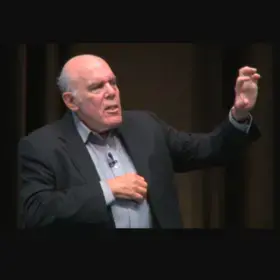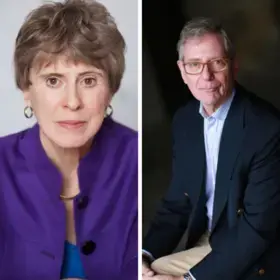Nancy Dixon, Ph.D.
Founder, Common Knowledge Associates
Nancy Dixon is a teacher and researcher. She started at the University of Texas before joining George Washington University. The subject of her research and writing has been about improving how organizations communicate internally. She has said her work is based on a profound conviction that engaging each other in conversation is the only way that change occurs in organizations and the wider world. She believes in Fernando Flores' postulation that "an organization's results are determined through webs of human commitments, born in webs of human conversation." Dixon has drawn her understanding from numerous theorists and thinkers, among them David Bohm on dialogue, Reg Revans on action learning, Karl Weick on sensemaking, Amy Edmondson on psychological safety, and Chris Argyris on the need for valid information, free and informed choice, and internal commitment to that choice.
Dixon left full-time teaching in 2000 when her book on knowledge management, Common Knowledge: How Companies Thrive by Sharing What They Know, was published by Harvard Business School. She then started her own consulting and research practice, Common Knowledge Associates. Her Knowledge Management practice has focused on the human side of KM, including post-bureaucratic forms of organizing, dialogue, and virtual work. She has worked with The World Bank, NASA, The Defense Intelligence Agency (DIA), The World Health Organization (WHO), USAID, and Save the Children, and many others.
Research and Consulting Interests
Post-bureaucratic Forms of Organizing
Dixon has conducted research to learn from and about post-bureaucratic forms of organizing (Glimpses of Organizations in the Act of Learning). Her consulting has focused on helping organizations move beyond hierarchy to post-bureaucratic forms of organizing. Such organizing goes by various labels, self-management, organizational democracy, humanocracy, flat organizations, and networked organizations, but Dixon believes that "whatever the name, these organizations have a culture of transparency, where employees have greater decision rights, and learning and experimentation are valued over control."
Dialogue
Dixon's consulting and research on dialogue have focused on improving how members of organizations interact with each other (Speaking Up 101). She provides workshops on dialogue to help groups work more effectively together. "The complexity of the world in which we now live continually requires new answers from us, as citizens, organizational employees, families, and members of the human community. The only way we can develop answers to those increasingly challenging problems is to improve the way we interact with each other at each of those levels. The world needs dialogue to create a shared understanding of the issues we jointly face. But convened meetings rarely gather people to collectively make sense of an issue, whether in our legislatures or organizations. More typically, the purpose is to "sell" a solution, not to build an understanding of the issue from multiple perspectives. Dialogue provides a way of talking together that offers hope for us to create the organizations, government, and the world we want."
Virtual and Remote Work
Dixon has conducted research on virtual teams (Learning Together and Working Apart) and consulted with organizations to make virtual work effective. "I believe hybrid-virtual work is the way of the future. It holds great financial and talent advantages for organizations, and it provides much-needed flexibility and autonomy for knowledge workers. There seems to be general agreement about a hybrid approach to work. But how that hybrid is designed can make all the difference. In planning, leaders are faced with balancing issues related to 1) employee preference for managing their work-life balance, 2) the potential of reducing the cost of office space, 3) concerns about what increased commuting will do to the environment, and 4) the need to rebuild a sense of belonging among team members. Rebuilding a sense of belonging within teams requires that all team members periodically come together face-to-face. Coming together might occur every other week, once a month, or even once a quarter, and might be for three days or a whole week, depending on the team's task interdependence level."
Volunteer Work
Dixon is the president of the U.S. Academy of Professional Dialogue. "Our vision is: To heal fragmentation in consciousness and create wholeness in the world through dialogue. I conduct monthly interviews with leading thinkers and practitioners of dialogue."
Since 2016 Dixon has moderated Braver Angels workshops. Braver Angels is a non-profit dedicated to reducing political polarization. The organization brings liberals and conservatives together to understand each other beyond stereotypes, forming red/blue community alliances and teaching practical skills for communicating across political differences. "Better Angels does not try to convince anyone to change their political stance; rather, we believe that the diversity of ideas is necessary for a democracy and requires civil dialogue among those diverse elements."
Education
- Ph.D., North Texas State University
- M.A., East Texas State University
- B.A., University of Kansas
Publications
- CompanyCommand: Unleashing the Power of the Army Profession. (With Burgess, T., Allen, N., Kilner, P. and Schweitzer, S.) United States Military Academy, (2005).
- Common Knowledge: How Companies Thrive by Sharing What They Know. Harvard Business School Press. (2000).
- The Organizational Learning Cycle: How We Can Learn Collectively. 2nd Edition. London: Gower. (1999).
- Dialogue at Work. London: Lemos and Crane. (1998).
- Helping Leaders Take Effective Action: Program Evaluation. The Center for Creative Leadership. (1997) with Dianne Young.
- Perspectives on Dialogue: Making Talk Developmental for Individuals and Organizations. The Center for Creative Leadership. (1996).
- The Organizational Learning Cycle: How We Can Learning Collectively. (1994). McGraw-Hill.
- The Academic Guide to the Models for HRD Practice. (1991) American Society for Training and Development. (with J. Henkleman)
- Evaluation: A Tool for HRD Quality. (1990). University Associates.

